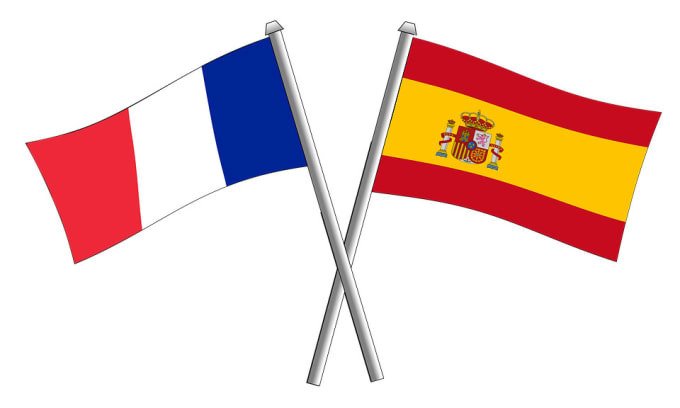Is it easier to learn French or Spanish?

Introduction
Many English speakers in the United States believe that Spanish is a more straightforward language to pick up than French is. To fulfil a foreign language requirement in high school, many students in the United States opt for Spanish, either because they believe it is a more functional language or the easiest to learn. Students in Europe see learning languages as second nature. So is it easier to learn French or Spanish?
Compared to French pronunciation and spelling, the ordinary learner may find Spanish easier to pick up, but a language's phonetics is only one part of its overall structure. The concept that one language is fundamentally more sophisticated than the other loses all relevance when other elements such as syntax and grammar are considered. Students who have studied French and Spanish may have differing opinions on the difficulty of each language. For example, some students may think Spanish is more accessible than French, while others may find French easier than Spanish.
Which Language is more popular, French or Spanish?
Both French and Spanish are popular languages for English speakers to acquire as a second language. If you're deciding between French and Spanish, you may be wondering which one is easier to learn.
Many English speakers believe that learning Spanish is more straightforward than French. That may be true, but is it really? Is it difficult to learn French?
Is it easier to learn French or Spanish?
You'll need to know more verb tenses, moods and conjugations in Spanish than French. The difficulty of spelling and pronouncing French is cited as a reason for this discrepancy. Since Spanish is a phonetic language, learning new words and phrases is a breeze once you've mastered the laws of accentuation and pronunciation. It's easier to become fluent in Spanish.

Which language is more challenging to learn?
English is often regarded as a complex language for non-native speakers to learn because of its inconsistent spelling, complex grammar, and syntax. English speakers learning a new language can be challenging. Each language has its own set of problems. No one can definitively say, "is it easier to learn French or Spanish?" neither language is easier to understand than English.
Should you choose a language based on interest or how you will use it?
This means that you should genuinely choose a language to learn based on your interest and how you intend to utilize the language rather than how "simple" it is. So, if you want to learn a new language, you should choose one based on your interest in it and how you intend to use it, rather than how "simple" it is.
Is French or Spanish easier to learn for English speakers
Neither language is more or less challenging than the other. For the first year or so, learning Spanish may be a little easier than learning French, mainly because novices are less likely to suffer from pronunciation. In contrast to the two words for "you" in French, Spanish beginners must deal with dropped subject pronouns and four words for "you.
Spanish or French, Which is more difficult?
Spanish grammar grows increasingly tricky, with some elements more challenging than French's in some cases. If one learns French first and then Spanish, the latter will appear more accessible than the former because the two languages are similar. While both of these languages have their challenges, one is more likely more complicated than the other.

Should I learn French or Spanish first?
Which language should I learn? French or Spanish, which one do you think is more beneficial for everyday life. I'm not sure if this will be an issue of debate, but in my opinion, the answer seems pretty obvious. Both languages have their advantages and drawbacks, depending on your learning objective.
Is French or Spanish better to learn?
This is a challenging question because the two languages have many similarities. For example, French and Spanish are European languages influenced by other cultures when they evolved into modern forms. However, a critical difference lies in how each language constructs sentences. Sentence structure plays a vital role in learning either language.
Is French or Spanish more useful?
Why not both?
I know many people who would love to learn French but haven't had the chance. Some need more Spanish practice because they either live in an area where it's spoken commonly or want something other than English as their first language! You may wish to travel to counties where both languages are spoken and want to converse.

Why do we compare French and Spanish?
What's the point of comparing the French and Spanish languages when they sound so different? According to the lexical similarity between French and Spanish, 75 per cent of the terms in these languages are pretty similar.
By way of contrast, the linguistic similarities between English and French or Spanish are both less than 50%. You might be wondering why.
Romance Languages
It's important to remember that both French and Spanish are Romance languages, which means that they stem from Vulgar Latin, the dialect of Latin used by the Roman peasants.
It took several centuries for Spanish and French to emerge as independent languages from their Latin ancestors. It is remarkable how quickly Spanish and French emerged as separate languages.

The Evolution of French and Spanish
In just two centuries after their birth in medieval Europe, the languages had extended their reach across large regions on that continent. This includes areas previously occupied by Latin speakers like Italy and Germany. These regions are now home to entirely new sets of people who spoke these poly-dialects rather than any specific regional dialect associated with those nations.
What are the 5 major romance languages?
● French
● Spanish
● Italian
● Portuguese
● Romanian
Although it is descended from West Germanic, English has drawn considerably from Latin and other European languages, such as French. Hence the same vocabulary between current English and French and Spanish.
Germanic languages like German and Dutch are related to English.

How are French and Spanish Similar
How closely related are the French and Spanish languages? French and Spanish aren't the only languages to share an origin and a vocabulary when it comes to linguistic commonalities.
Let's start with the alphabet, which is the most obvious one. The Latin alphabet is used in Spanish and French, except for one letter: the "ee."
Accents and Emphasis.
The grammatical parallels between French and Spanish are also striking. Formal and informal "you," two past tense forms, gendered nouns, and unique subjunctive verb forms are all present in both languages.
Accents are another feature that distinguishes French and Spanish from English. The letters are given an accent in both languages to emphasize a word's pronunciation.

Which Language has more accents?
French has more accent marks than Spanish. For this reason, it's probably easier to learn French and Spanish together than to learn either language on its own for the first time.
For someone who already speaks French, learning Spanish as a second language may not be as time-consuming as one might expect.
Can a fluent French speaker comprehend a Spanish speaker?
Many words in French and Spanish are similar. A French speaker may understand what a Spanish speaker says in French and the other way around.
Here are some words and phrases that are similar in both languages:
- No: no/non
- Country: país/pays
- Bad: mal/mal
- Repeat: repetir/répéter
- Pardon me: perdón/pardon
Pronunciation and accentuation differences
However, it is almost impossible for a Spanish speaker to understand French because of the vast differences in pronunciation and accentuation between the two languages.
However, even if they were both native French speakers and native Spanish speakers, it would be tough for them to converse orally and comprehend each other beyond that point.

Is it better to speak French or Spanish?
The answer to this question, like the relative ease of learning French or Spanish, is highly debatable.
French and Spanish are two of the world's most widely spoken languages. Spanish is the world's fourth most common language, followed closely by French in global usage.
5 languages spoken most widely in the world are:
English
Chinese Mandarin
Hindu
Spanish
French
Do more people speak Spanish than French?
Despite the fact more people speak Spanish than French around the world, the usefulness of either language is highly dependent on where you are or where you intend to travel.
Spanish is more widely spoken than French in North, Central and South Americas. Learning Spanish will come in handy if you plan a trip to Latin America.

French in Canada
It's the country's official language. More than 20% of the population speaks French as their native tongue, most of whom reside in Quebec's eastern province. It's widely used for international communication. After all, understanding French will be more helpful if you're in Canada or planning to travel or do business there.
French in Africa
If you're selecting between studying French or Spanish for practical purposes, the most crucial consideration is your geographic location. French is the dominant language in Africa. The majority of the population speaks French rather than Spanish. There are only a handful of places where French is an official language besides Africa and the French-speaking countries of Europe.

Cultural Considerations
However, there are cultural reasons to study only one of the two languages. If, for example, you prefer Spanish or French films and literature, it could be a deciding factor in your decision to learn one of those languages. You might like to choose to study either language because of this.
Should my child learn French or Spanish?
This question can be decided by more than just which country you're from or how rich you are. It comes down to your personal preferences for specific languages and whether these fit with the culture in general. For example, if someone who speaks only Spanish wants another equally widespread tongue, then French would be a good option or vice versa.

What is the best language for a child to learn?
This is a question that has been debated for years. Some argue it's best if the child learns two languages. Still, others say learning more than one language can confuse them and make pronunciation difficult later in life when they learn English as their second or third tongue! Learning in two languages boost graduate rates [4]
What is the best language for a child to learn?
A common debate among parents, educators and casual linguists alike concern whether it's necessary or even possible for children under 12 years old to speak more than one language. I've heard that some people say English is the best language for kids to learn because it's considered universal. Then Spanish follows closely in the Americas and French in Europe.

What is the best age to learn French?
"How old must you be to learn French?" This is a common query. Learning a new language may seem complicated, but with perseverance, everything is possible! Most experts believe that teens should start studying early rather than late to avoid conflicting with other schoolwork that may take priority over learning languages.
Homeschooling and Languages
Homeschooling can be an excellent way for children to learn about languages. They must be taught by someone who knows the subject matter. There is no one-size-fits-all with homeschooled education. If you are a parent, who home school your children, check out BNMS Academy [3]. They provide lots of information and help with homeschooling and what you need to know.
Why is using Preply good to help learn languages?
Did you realize that some people have no problem learning multiple languages? We all know how difficult it can be to keep up with our foreign language lessons. We recommend using expert online language tutors at Preply. They provide face to face tuition in French, Spanish and many other languages. Click here to sign up with Preply [1].
Conclusion
Is it easier to learn French or Spanish? Neither language is more or less challenging than the other. For the first year or so, learning Spanish may be a little easier than learning French, mainly because novices are less likely to suffer from pronunciation.
In contrast to the two words for "you" in French, Spanish novices must deal with dropped subject pronouns and four words for "you." Later on, Spanish grammar grows increasingly tricky, with some elements even more challenging than French's in some cases.
For example, if one learns French first and then Spanish, the latter will appear more straightforward than the former because the two languages are similar. While both of these languages have their challenges, one is more likely more complicated than the other.
References
3) BNMS Academy - Help with Homeschool
4) Learning in two languages boost graduates rates
